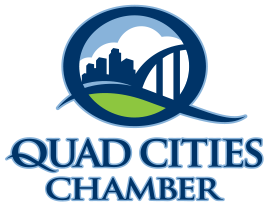
The Quad Cities Chamber of Commerce announced its 2018 legislative priorities Tuesday – many which require funding – designed to support a competitive business climate, skilled workforce, quality-of-place programs and modern infrastructure and transportation systems.
Interim CEO Kristin Glass said public policy platform is “truly reflective of the needs of area companies.
The Chamber’s 19-member Business Advocacy Council developed the 2018 platform based on feedback from members.
“In the coming months, business leaders will work together to encourage legislation that will help our economy and community continue to grow,” she said. “I encourage anyone who is interested in these matters to get involved in our collective advocacy efforts.”
In Illinois, the Chamber wants to increase school funding and ensure full funding of budget obligations, higher education and tuition aid.
It also wants to ensure money is available for road and transportation projects, including a the Interstate 74 bridge now under construction, a planned six-lane I-80 bridge, passenger rail service and a third phase of developing the Western Illinois University campus in Moline.
“It’s important our businesses and communities have the necessary tools to succeed and grow,” said Natalie Linville-Mass, owner of Rock Island-based Media Link.
“This means renewal of the Quad-Cities Enterprise Zone,” she said. “Enterprise zones are the best and most flexible tool we have in Illinois. The Quad-Cities’ current zone will expire in March.”
State historic tax credits also are needed for Illinois communities, she said, noting Iowa offers them for historic building renovations. Nasreen Khan, owner of The Vault Beauty Lounge & Urban Retreat in Davenport which opened in February, said Iowa’s historic tax credit helped cover about 10 percent of her $350,000 renovation costs.es is allow us to get over the hump of start-up costs,” she said. In Davenport alone, the tax credit is responsible for supporting $400 million in development in the past 15 years, she said.
Ms. Linville-Mass also said Illinois needs pension and worker’s compensation reform, noting the rates for the latter are 50 percent higher than in Iowa. Lowering Illinois’ home-rule threshold from 25,000 to 5,000, she said, would give more communities more control over public resources.
“This would provide East Moline, Silvis, Milan, Colona and Geneseo the ability to have much greater control over how and where they invest resources,” she said. “Currently, only Rock Island and Moline have home rule.”
— In Iowa, the Chamber wants lawmakers to support workforce development and education, economic development tools and growth opportunities. It also hopes to change the education funding formula to ensure equal funding per student, enact tax reform to simplify and streamline the tax code and enhance transportation connections between the Quad-Cities and the rest of Iowa.
“A skilled workforce is our biggest selling point,” Ms. Khan said.
The Chamber also wants federal officials to strengthen long-term energy production and access, invest in transportation and infrastructure, and support the growing local defense industry.
The Chamber listed last year’s successes as including legislation to provide more opportunities for the Rock Island Arsenal Joint Manufacturing and Technology Center, working with Illinois legislators to keep open the Quad Cities Generating Station near Cordova and passing mental health legislation designed to let providers better serve the public.
The Chamber is planning luncheons with elected officials on Jan. 29 and March 16 in Iowa and Feb. 9 and April 6 in Illinois. Chamber members also plan to visit lawmakers Feb. 7-8 in Des Moines, March 7-8 in Springfield and March 21-23 in Washington, D.C.
http://qconline.com/business/state-funding-tops-chamber-s-legislative-priorities/article_25aec3c7-9dd6-57ca-b6ac-0355f188a570.html